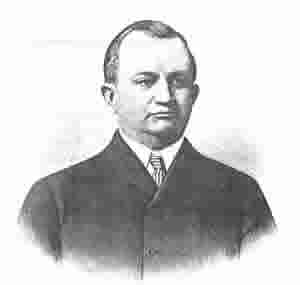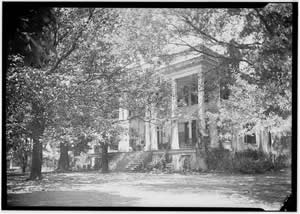|
William
Burwell Walker of Aberdeen, Mississippi

William
Burwell Walker
Source
of photo and the following article is: Rowland, Dunbar,
ed. Mississippi, Supplemental Volume, Comprising Sketches
of Representative Mississippians for Whom Special Portraits
Have Been Executed on Steel. [Vol. 4] Atlanta: Southern
Historical Publishing Association, 1907. (pp. 299-301)
William
Burwell Walker, who died in the city of Jackson, Miss.,
Feb. 17, 1904, while a member of the State senate, was a
leading member of the bar of Monroe county and was engaged
in the practice of his profession at Aberdeen until the
time of his death, in the very prime of a noble and useful
manhood. Senator Walker was born in Okolona, Chickasaw county,
Miss., Jan. 24, 1859, and was a son of Dr. William F. and
Eliza (Hill) Walker. His father, who was graduated in the
New York medical college, became one of the prominent physicians
and surgeons of Mississippi and represented Chickasaw county
in the State legislature in 1858. The original progenitor
in America came from Dublin, Ireland. Burwell Pope Hill,
a maternal ancestor of the senator, was a descendant of
Burwell Pope, who was an officer in the Continental line
during the War of the Revolution. Dr. William F. Walker
was a soldier of the Confederacy in the war between the
States. The subject of this memoir was graduated in the
academic department of the University of Mississippi, with
the degree of Bachelor of Arts, and had also completed the
prescribed course in the law department of the same institution,
from which he received the degree of Bachelor of Laws in
1882. He ever maintained a deep interest in his alma mater
and was a member of its board of trustees at the time of
his demise. Immediately after his graduation and admission
to the bar, Senator Walker engaged in the practice of his
profession in Aberdeen, where he soon entered into partnership
with Harvey Murphy, under the firm title of Murphy &
Walker. After his term of service as district attorney he
formed a partnership with C. L. Tubb, and the firm of Walker
& Tubb thereafter continued in business until the death
of the senior member, controlling a large and important
practice in both the State and federal courts. Senator Walker
was known as a man of fine professional talent and rose
to distinction in his chosen profession. His political support
was given to the Democratic party and he was a zealous worker
in its ranks. He was presidential elector on the party ticket
in 1884, when Grover Cleveland was elected president, and
in 1892 he was alternate delegate from his State to the
Democratic national convention. In 1887 he was elected district
attorney, of which office he remained incumbent eight years,
proving a most able public prosecutor. In 1903 he was elected
a member of the State senate and was serving in that capacity
at the time of his death, as already noted. Early in the
session he was stricken with the illness which terminated
in his death. He was dominated by a spirit of the most impregnable
integrity and honor, and his life was one of signal purity
in all its relations. No man in Monroe county was held in
more unequivocal confidence and esteem, and he was known
as a loyal, liberal and public-spirited citizen. His Christian
faith was a very part of his life and he was a devoted member
of the Methodist Episcopal church, South, as is also his
widow. He was affiliated with the Masonic fraternity, Knights
of Pythias, Independent Order of Odd Fellows, Benevolent
and Protective Order of Elks, and the Delta Kappa Epsilon
college fraternity. He attained to the chivalric degrees
in the Masonic order, was a member of the Aberdeen commandery,
and was also identified with the Mystic Shrine. He served
as deputy grand master of Masons in the State, was a member
of the law committee of the Odd Fellows grand lodge, served
as chancellor commander of the local lodge of the Knights
of Pythias, and also held membership in the Knights and
Ladies of Honor. Senator Walker attained to distinctive
success in temporal affairs and made good use of his success.
He was interested in farm lands in the Delta district and
was a stockholder in the Aberdeen National bank. On June
7, 1888, he was united in marriage to Miss Mary Dudley Sykes,
daughter of Capt. Thomas and Maria H. (Jones) Sykes, of
Aberdeen. Captain Sykes was born in Alabama, a son of Dr.
William A. Sykes, who was one of the early settlers of Monroe
county, Miss., where he practiced his profession and also
became a successful planter and a large owner of slaves.
Captain Sykes was a captain on the staff of General Jackson
in the Civil war, and was one of the prominent and honored
citizens of Monroe county at the time of his death. Senator
Walker is survived by three children--Corinne, Mary Dudley
and William Burwell.

W.
B. Walker Home
Photographed by James Butters, June 3, 1936
Credit Line: Library of Congress, Prints and Photographs
Division, Historic American Buildings Survey, HABS, MISS,
48-ABDE,5-1.
|

